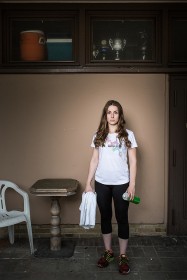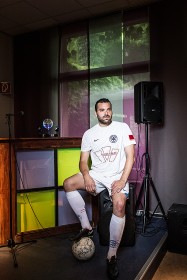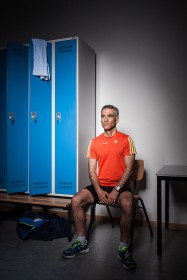The 14th European Maccabi Games (EMG) are taking place in Berlin from 27 July until 5 August 2015. More than 2,000 Jewish athletes from 36 countries will compete in 19 sports from football to fencing to chess. To accompany the games Tamar Lewinsky and Theresia Ziehe are producing a series of portraits with interviews, introducing a new member of the German delegation from Berlin every day here on the blog. They conducted the interviews on the grounds of the TuS Maccabi in Berlin’s Grunewald where Stephan Pramme also shot the portraits.
Daliah Hoffmann (24), half-marathon

Daliah (24) Half Marathon © Jewish Museum Berlin, photo: Stephan Pramme
Daliah, why are you taking part in the European Maccabi Games?
I’m here because sports are an extremely important part of my life, and, of course, I want to experience this event in Berlin; it’s an opportunity not to be missed. However, I thought twice about it because I’ve already run a half-marathon this year, and that was enough. Yet it’s really nice to run together with family.
What’s required to participate in these Games?
First of all, you have to show you’re Jewish with your birth certificate and those of your family, as far as I can recall. If it were up to me, I’d also let people in who somehow feel connected to the religion. I think it’s unfortunate that some aren’t allowed to be part because they aren’t Jewish on paper, but feel Jewish or were raised Jewish, even if their mother isn’t.
What does Judaism mean to you personally? → continue reading
The 14th European Maccabi Games (EMG) are taking place in Berlin from 27 July until 5 August 2015. More than 2,000 Jewish athletes from 36 countries will compete in 19 sports from football to fencing to chess. To accompany the games Tamar Lewinsky and Theresia Ziehe are producing a series of portraits with interviews, introducing a new member of the German delegation from Berlin every day here on the blog. They conducted the interviews on the grounds of the TuS Maccabi in Berlin’s Grunewald where Stephan Pramme also shot the portraits.
Ben Lesegeld (28), soccer
Ben, what role does it play for you that a part of the European Maccabi Games will be held at Berlin’s 1936 Olympic park?

Ben (28) soccer © Jewish Museum Berlin, photo: Stephan Pramme
On the one hand, it’s very special for me as an athlete, because the Olympic compound offers us a completely professional setting. On the other hand, it gives me a queasy feeling. The architecture of the Olympic Stadium always leaves me a little bit awestruck. For me, it’s not simply a “wonderful setting” though, because the stadium always reminds one of the history. So it’s not that simple to participate in an athletic event there with ease, joy, and pleasure. For me personally, it’s important to think about the people who weren’t allowed to take part back then. But I still find it good that the Maccabi Games are happening there. It shows that life must go on: we know exactly what happened there, but we keep going, we take part in a sporting event – despite this history – and we show that the future will be an open one.
What requirements must one fulfill – aside from athletics – in order to participate? → continue reading
The 14th European Maccabi Games (EMG) are taking place in Berlin from 27 July until 5 August 2015. More than 2,000 Jewish athletes from 36 countries will compete in 19 sports from football to fencing to chess. To accompany the games Tamar Lewinsky and Theresia Ziehe are producing a series of portraits with interviews, introducing a new member of the German delegation from Berlin every day here on the blog. They conducted the interviews on the grounds of the TuS Maccabi in Berlin’s Grunewald where Stephan Pramme also shot the portraits.
Dr. Alon Padovicz, 60, half-marathon

Alon (60) Half Marathon © Jewish Museum Berlin, photo: Stephan Pramme
What meaning do you feel it has, that the European Maccabi Games are taking place in Berlin, and in particular at the Olympic Stadium? It’s a place of symbolic importance since Jewish athletes weren’t allowed to participate in the 1936 Olympics…
To be honest, for me it’s nothing special. I’ve lived in Berlin for more than 50 years, and it’s normal to me that Jews come to Berlin or undertake some project in Berlin. Even the place – the Olympic Stadium – isn’t extraordinary to me. I often participate in competitive events in Berlin, for instance in the 25-kilometer race, and we always finish at the Olympic Stadium. It’s not a new feeling for me. I think it’s nice that we can do this here. But I’m not drawing the big arc back to 1936, although I am of course aware of the historical significance.
And being part of the German delegation – what role does that play for you? → continue reading


